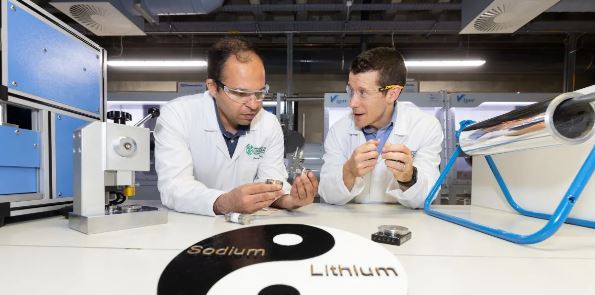Science
University of Limerick Unveils Groundbreaking Dual-Cation Battery

Researchers at the University of Limerick have achieved a significant milestone in energy storage technology with the development of the world’s first full-cell dual-cation battery. This innovative battery design integrates both lithium and sodium ions, enhancing performance and stability, and could potentially transform the landscape of electric vehicles and portable electronics.
The findings were published in the journal Nano Energy and led by Hugh Geaney, Associate Professor in Chemistry at the university’s Department of Chemical Sciences and Principal Investigator at UL’s Bernal Institute, alongside Dr. Syed Abdul Ahad, a Government of Ireland postdoctoral fellow. Their research was conducted in collaboration with experts from the University of Birmingham.
Unlike traditional sodium-only batteries, this dual-cation system leverages the advantages of both lithium and sodium, primarily relying on sodium to ensure efficiency and sustainability. “For the first time, we’ve shown that sodium-ion batteries can be ‘supercharged’ by pairing sodium and lithium in a sodium-dominant dual-cation electrolyte,” said Geaney. This breakthrough could pave the way for more sustainable and high-performance battery technologies.
Dr. Abdul Ahad, who conceptualised and executed the experimental work, noted that the introduction of both lithium and sodium cations effectively doubles the battery’s capacity compared to conventional sodium-ion batteries. This advancement has not been previously achieved with the anode materials utilized in this research, which are anticipated to provide significant capacity for sodium-ion applications.
The battery’s design allows lithium ions to function as a “capacity booster” within the electrolyte, enhancing the overall performance of the sodium-ion system while ensuring long-term stability. This innovative approach increases energy density, which is vital for extending the range of electric vehicles, while also improving safety and sustainability by reducing dependence on expensive and environmentally challenging materials, such as cobalt.
Historically, sodium-ion batteries have been viewed as a more sustainable alternative to lithium-ion batteries, which currently dominate the market. However, sodium-ion batteries typically exhibit lower energy density, leading to inferior performance. The new dual-cation technology changes this dynamic, allowing sodium ions to deliver high capacity. The battery can undergo up to 1000 cycles, making it a more environmentally friendly and cost-effective option.
The research received backing from the Government of Ireland Postdoctoral Fellowship and the Research Ireland Frontiers for the Future programme. The research team plans to expand their investigation to explore new material combinations and ion systems, including silicon-based anodes and alternative pairings such as lithium-magnesium and potassium-lithium.
This breakthrough represents the latest achievement from the Geaney Research Group, which is committed to advancing materials for energy storage applications. The group focuses on developing innovative solutions for lithium-ion and next-generation batteries, emphasizing materials characterisation and design to remain at the forefront of battery innovation.
With over 30 active researchers in UL’s battery cluster and the multidisciplinary AMPEiRE centre for battery and energy materials research, the University of Limerick continues to lead efforts in creating next-generation energy solutions. The implications of this research extend beyond academia, offering promising pathways for the future of sustainable energy technologies.
-

 Top Stories1 month ago
Top Stories1 month agoTributes Surge for 9-Year-Old Leon Briody After Cancer Battle
-

 Entertainment3 months ago
Entertainment3 months agoAimee Osbourne Joins Family for Emotional Tribute to Ozzy
-

 Politics3 months ago
Politics3 months agoDanny Healy-Rae Considers Complaint After Altercation with Garda
-

 Top Stories2 months ago
Top Stories2 months agoIreland Enjoys Summer Heat as Hurricane Erin Approaches Atlantic
-

 World3 months ago
World3 months agoHawaii Commemorates 80 Years Since Hiroshima Bombing with Ceremony
-

 Top Stories3 months ago
Top Stories3 months agoFianna Fáil TDs Urgently Consider Maire Geoghegan-Quinn for Presidency
-

 World3 months ago
World3 months agoGaza Aid Distribution Tragedy: 20 Killed Amid Ongoing Violence
-

 World3 months ago
World3 months agoCouple Convicted of Murdering Two-Year-Old Grandson in Wales
-

 Top Stories1 month ago
Top Stories1 month agoNewcastle West Woman Patricia Foley Found Safe After Urgent Search
-

 Top Stories2 months ago
Top Stories2 months agoClimbing Errigal: A Must-Do Summer Adventure in Donegal
-

 Top Stories2 months ago
Top Stories2 months agoHike Donegal’s Errigal Mountain NOW for Unforgettable Summer Views
-

 World3 months ago
World3 months agoAristocrat Constance Marten and Partner Convicted of Infant Murder









